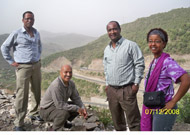jbrehm2, October 15, 2010 | View original publication
Food security projects in Ethiopia
Members of a research team from the University of Nebraska-Lincoln traveled to Ethiopia during the summer to lay the groundwork for research on improving food security, including establishing partnerships with universities there.
The four who traveled — an anthropologist, a climatologist, an agronomist and a soil scientist — understand the culture, and speak one or more of the major ethnic languages.
The team met with representatives of universities, nongovernmental organizations, government agencies, and most importantly, the farmers and villagers who work every day to have enough food and water for themselves and their families. The team was able to conduct meetings in rural areas in Amharic and Oromo without outside translators.
Those traveling were Martha Mamo, soil scientist and overall project coordinator; Shimelis Beyene, a biological anthropologist who specializes in applied and development anthropology; Tsegaye Tadesse, a climatologist with the National Drought Mitigation Center, based at UNL's School of Natural Resources; and Teshome Regassa, crop physiologist and extension agronomist. Partners at Ethiopian universities include an agricultural economist and an entomologist.
"Usually research is done by people external to the culture," Beyene said. "We're working in places where we went to school or were brought up. We have both the native perspective and also the scientific background" to address food security issues. The team incorporates expertise from both biological and social sciences.
One of the team's first accomplishments this summer was to establish collaboration agreements between UNL and two universities, Haramaya University in Harar and Wollo University in Dessie, in the Amhara region. This will lead to more student and faculty exchanges and study abroad opportunities.
Next summer they plan to return to conduct surveys, based on this summer's research. The team also is looking for research funding to address some of the issues they identified, and that can benefit from the institutional partnerships they established.
"We heard the challenges and priorities from the university, and also from the people who actually face the problems," Mamo said.
The trip was eye-opening. Beyene said he was shocked to see how much poverty had increased and habitats had been devastated since his last visit to some areas but was encouraged that organizations and agencies were more aware of the problems and different approaches to addressing the issues.
The team saw many ways in which physical resources such as soil and water were stretched too thin to comfortably support the population. "If you don't have enough feed for the oxen, you can't till the ground," Regassa said. "If you can't till the ground, you are going to face moisture stress due to a lot of weeds."
In some cases, fertilizer is too expensive or not available, and animal manure already is being used used as fuel. Crop residue is used for construction, firewood and animal feed.
"These are soils that have been cropped for years and years and without replenishing the nutrients," Mamo said. Under the family farming systems the team observed, "everybody works — adults, children, they have a contribution," she said. "What saddens you is the work doesn't necessarily translate into improving their lives." Families may need children's help on the farm, or may not be able to afford to send them to school, so education is sometimes out of reach.
Despite the obstacles, the team observed farmers who are doing everything in their power to improve their lives. "They don't have education, but they improvise to solve their problems," Mamo said. "Some have created irrigation wells. They're doing well. Now their problem is market rather than production constraints."
Limited access to water was a recurring theme in the villages they visited.
Many farmers had no access to irrigation.
"It's not a one-solution kind of problem," Regassa said. "We have to come up with different options that farmers will consider based on the resources they have." Without access to credit, "you can have technology that makes miracles, but if the farmer can't afford it, it's useless."
Tadesse said that he was surprised to hear that most farmers "are not using predictions at all. The radio broadcasts predictions for up to 10 days ahead, similar to information available in the United States. Farmers take a risk and plant. If it's a good year, they get the crop. If it's not good, at least the failing crop is fed to animals."
Beyene added, "There are a lot of soft skills that would help address these issues, rather than just hard technology. We have a lot of knowledge and skills here which can be fruitfully applied. At the same time, it would provide a lot of research opportunities for faculty and graduate students."
It will be key for solutions to be holistic, Beyene said.
"Communities do not see things in a sectoral way," he added. Food is connected to health, social organization, marriage, kinship systems and livelihoods. Incorporating the community's knowledge expands the information available to the team and greatly increases the likelihood of community buy-in and efforts that are sustainable in the long term.
Tadesse stressed the team hopes its project will result in methods that can be used in other countries and cultures, and they will incorporate other disciplines as needed.
Other team members are Raymond Hames, an anthropologist with ethnographic expertise, and Mary Willis, a biocultural anthropologist who works on health and nutrition issues in East Africa. Other collaborators are Joseph Debebe, Ceres Inc., and William Waters, UNL's Culture Center.
The project is funded through UNL's Institute of Agriculture and Natural Resources Agricultural Research Division.






